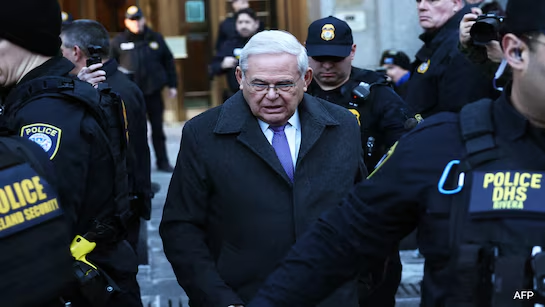
Former U.S. Senator Robert Menendez has been sentenced to 11 years in prison for a series of serious offenses, marking a significant fall from grace for the once-powerful New Jersey Democrat. This sentencing comes as a result of Menendez’s conviction on charges of bribery, acting as a foreign agent, and obstruction of justice.
The Charges and Conviction
Menendez’s legal troubles stem from a complex web of corrupt activities that spanned several years. The former senator was found guilty of:
- Bribery: Menendez accepted hundreds of thousands of dollars in bribes from various sources, including businessmen and foreign officials.
- Acting as a Foreign Agent: He was convicted of using his position as a U.S. senator to benefit Egypt, effectively acting as an unregistered foreign agent.
- Obstruction of Justice: Menendez was also found guilty of attempting to interfere with the investigation into his activities.
The Sentencing
The 11-year prison term handed down to Menendez reflects the severity of his crimes and their impact on public trust. This sentence serves as a stark reminder of the consequences of corruption at the highest levels of government.
Broader Implications
Menendez’s case is part of a larger pattern of corruption-related prosecutions by the U.S. Attorney’s Office for the Southern District of New York. The office has been actively pursuing cases involving public officials, political organizations, and others in positions of trust. Recent examples include:
- A former high-ranking FDNY official pleading guilty to a bribery conspiracy.
- A PAC treasurer admitting to a multi-year scheme to defraud political action committee donors.
- A former corrections officer pleading guilty to accepting bribes in exchange for smuggling narcotics into Rikers Island.
These cases, along with Menendez’s, underscore the ongoing efforts to maintain integrity in public service and political organizations.
Significance of the Case
The conviction and sentencing of a sitting U.S. senator on such serious charges is a rare and significant event. It highlights:
- The reach of federal prosecutors in pursuing corruption at all levels of government.
- The potential consequences for public officials who abuse their positions of trust.
- The ongoing challenges in maintaining ethical standards in politics and public service.
Menendez’s case serves as a cautionary tale for other public officials and reinforces the importance of transparency and accountability in government. It also demonstrates the Justice Department’s commitment to prosecuting corruption, regardless of the political status or influence of the accused.As this high-profile case concludes with a substantial prison sentence, it leaves a lasting impact on New Jersey politics and serves as a reminder of the ongoing need for vigilance against corruption in public office.
